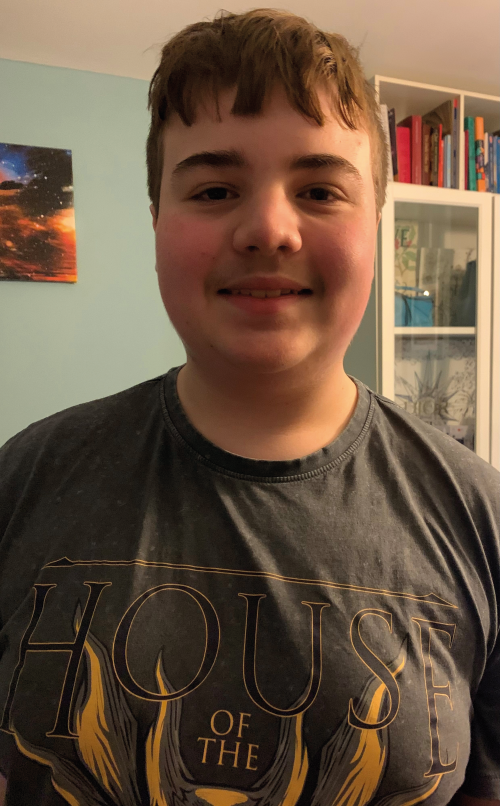Noah’s story: de novo variant in the FOXP4 gene
Noah lives near Exeter with his parents, Carys and Andy, and his 4 siblings. Seven years after joining the 100,000 Genomes Project in 2015, he received a diagnosis which showed a de novo variant in the FOXP4 gene.

About the FOXP4 gene
Scientists are still learning about the recently discovered FOXP4 gene and finding conditions caused by variants in it. To date, it’s been linked to neurodevelopmental disorders, delays in speech and language and some congenital abnormalities.
Only 10 children
worldwide have been diagnosed with these genetic variants
FOXP4 gene
is a protein-coding gene
Noah’s story

Noah was diagnosed before the age of 3 with autism and a learning disability, but his parents always wondered if there was something else going on.
His mum, Carys, explains: “We have always noted he looks different from his 4 siblings, 2 of whom also have autism diagnoses but don’t have the same learning difficulties, so we always thought there was something. We both thought if there was something to know then we’d like to know it – then we’d know what we could do to help.”
Getting a diagnosis
When the family’s geneticist at the Royal Devon Hospital in Exeter invited them to take part in the 100,000 Genomes Project in 2015, they were more than happy to sign up to see if an answer could be found.
Noah was 14 at the time, and his family were the first in the southwest to take part. Noah was especially delighted to be featured on his local television news programme about his participation!
The first round of genomic results found nothing of significance and Noah’s family were told additional testing would continue to be done over time.
Seven years later – in March 2022 – his parents, Carys and Andy, received a phone call telling them to make an appointment with the genetic team in Exeter. They knew something must have been found.
The family met with their geneticist and were told that a genetic ‘spelling mistake’ had been discovered – that a variant in the FOXP4 gene was the cause of Noah’s neurodevelopmental delays.
They were also told that it is a de novo variant, which means it isn’t hereditary. So neither parent has it and it is highly unlikely that their other children have it, too.
What getting a diagnosis means
Both Noah’s parents were relieved and grateful to find the cause and to know that their other children wouldn't be affected – and took comfort in knowing the diagnosis came without any additional health implications for Noah.
Andy says: “It was so good to find out there was no reduced life expectancy or any other health risks associated with the diagnosis.”
While the diagnosis doesn’t change things in a practical sense for the family or in terms of different treatments for Noah, it does provide them with an explanation and more understanding of what caused his condition. It also gives them the opportunity to learn more.
How whole genome sequencing can help
Noah’s parent now know he has an incredibly rare condition – only 10 children across the world have received the same diagnosis – and when seeing photos of these children, the family notice how they share similarities with Noah in body shape and other physical features.
They have also learnt that Noah’s posture might be affected by his condition. He is currently experiencing a painful neck and is due to have an x-ray to investigate the cause.
In the meantime, Noah, who has an amazing sense of humour and loves bad jokes, is excited at the prospect of being featured in the news once more and to help celebrate the 10-year anniversary of the Project.
A decade after it was launched, the ground-breaking 100,000 Genomes Project continues to deliver benefits and clarity to children like Noah and their families.